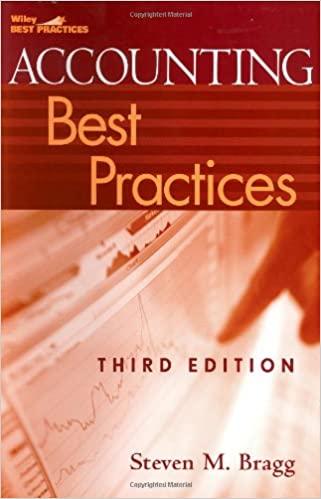Question
Herbert, Inc., acquired all of Rambis Company's outstanding stock on January 1, 2020, for $599,000 in cash. Annual excess amortization of $17,000 results from this
Herbert, Inc., acquired all of Rambis Company's outstanding stock on January 1, 2020, for $599,000 in cash. Annual excess amortization of $17,000 results from this transaction. On the date of the takeover, Herbert reported retained earnings of $486,000, and Rambis reported a $220,000 balance. Herbert reported internal net income of $41,000 in 2020 and $55,600 in 2021 and declared $10,000 in dividends each year. Rambis reported net income of $27,500 in 2020 and $42,100 in 2021 and declared $5,000 in dividends each year. a. Assume that Herbert's internal net income figures above do not include any income from the subsidiary. If the parent uses the equity method, what is the amount reported as consolidated retained earnings on December 31, 2021? . What would be the amount of consolidated retained earnings on December 31, 2021, if the parent had applied either the initial value or partial equity method for internal accounting purposes? b. Under each of the following situations, what is the Investment in Rambis account balance on Herbert's books on January 1, 2021? . The parent uses the equity method. . The parent uses the partial equity method. The parent uses the initial value method. c. Under each of the following situations, what is Entry "C on a 2021 consolidation worksheet? The parent uses the equity method. . The parent uses the partial equity method. . The parent uses the initial value method. Complete this question by entering your answers in the tabs below. Required A Required B Required C Assume that Herbert's internal net income figures above do not include any income from the subsidiary. If the parent uses the equity method, what is the amount reported as consolidated retained earnings on December 31, 2021? What would be the amount of consolidated retained earnings on December 31, 2021, if the parent had applied either the initial value or partial equity method for internal accounting purposes? Consolidated retained earnings (equity method) Consolidated retained earnings (initial value method) Consolidated retained earnings (partial equity method) Amounts Show less A
Step by Step Solution
There are 3 Steps involved in it
Step: 1

Get Instant Access to Expert-Tailored Solutions
See step-by-step solutions with expert insights and AI powered tools for academic success
Step: 2

Step: 3

Ace Your Homework with AI
Get the answers you need in no time with our AI-driven, step-by-step assistance
Get Started


